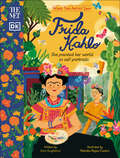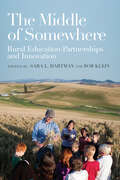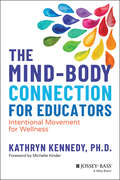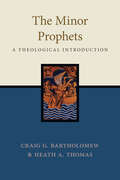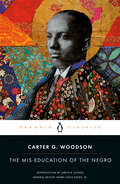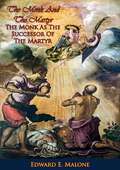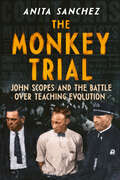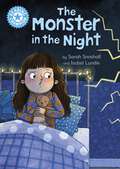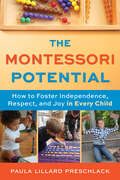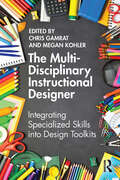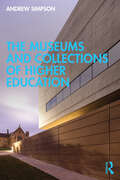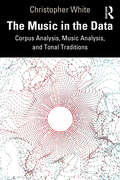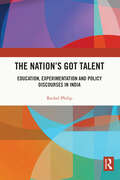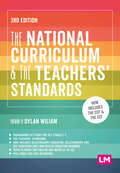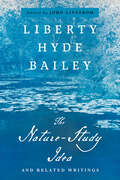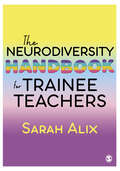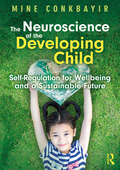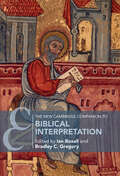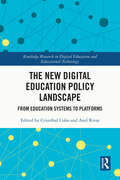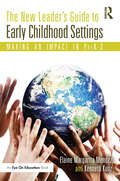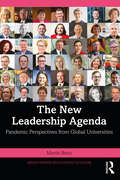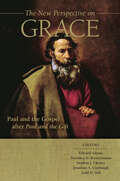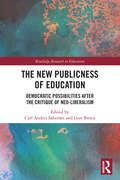- Table View
- List View
The Met Frida Kahlo: She Painted Her World in Self-Portraits (What the Artist Saw)
by Amy GuglielmoSee the world through Frida Kahlo's eyes and be inspired to produce your own masterpieces.Have you ever wondered exactly what your favorite artists were looking at to make them draw, sculpt, or paint the way they did? In this charming illustrated series of books to keep and collect, created in full collaboration with The Metropolitan Museum of Art, you can see what they saw, and be inspired to create your own artworks, too. In What the Artist Saw: Frida Kahlo, meet the famous Mexican painter. Learn all about how she experimented with different ways of painting herself, and how she channeled her experiences into her art. Have a go at producing your own self portrait!In this series, follow the artists' stories and find intriguing facts about their environments and key masterpieces. Then see what you can see and make your own art. Take a closer look at landscapes, or even yourself, with Vincent van Gogh. Try crafting a story in fabric like Faith Ringgold, or carve a woodblock print at home with Hokusai. Every book in this series is one to treasure and keep - perfect for budding young artists to explore exhibitions with, then continue their own artistic journeys.© The Metropolitan Museum of Art, New York
The Middle of Somewhere: Rural Education Partnerships and Innovation
by Sara L. Hartman and Bob KleinHighlights innovative partnership practices that help create educational opportunities for students in rural schools across the United States.As editors Sara L. Hartman and Bob Klein acknowledge, rural places have long experienced systemic inequities that decrease rural students' access to education, yet many rural schools and communities have found creative means to make up for the dearth of outside resources. The Middle of Somewhere brings to light a wide variety of partnerships that have been forged between K–12 schools, communities, and postsecondary institutions to improve educational access. The book showcases collaborations that address three different areas of need: partnerships that prepare and support teacher candidates and educators who work in rural areas; partnerships that extend the work of rural education networks; and partnerships that promote equity, justice, and inclusion within rural populations. Using case studies of rural educational partnerships from communities across the United States, the book's contributors share their experiences of how strong partnerships have formed both organically and through thoughtful and intentional planning, and they recommend supportive strategies for their development and sustainment. The contributors also explore the many ways in which university–school–community partnerships incubate solutions to challenges common to rural education systems, such as access to STEM education and higher education. The programs featured here may serve as replicable models for practitioners, researchers, and policy makers who want to enrich the experiences of children in their schools and communities.
The Mind-Body Connection for Educators: Intentional Movement for Wellness
by Kathryn KennedyPractical ways to support educator mental health and well-being In The Mind-Body Connection for Educators: Intentional Movement for Wellness, Kathryn Kennedy, founder and executive director of Wellness for Educators, delivers a research-based, practical approach to supporting educators with trauma- and equity-informed somatic strategies for mental health and wellbeing. The book explains how our minds and our bodies are intricately connected, and, consequently, both are highly affected by trauma and prolonged stress. As research shows, when this residual pain is not healed, new learning cannot take place. To support educators’ healing and learning processes, the book provides an overview of several mind-body disciplines, including yoga, mindfulness, meditation, Qigong, and breathwork. In addition to overviews of each discipline, Kathryn shares what the research says and provides engaging practices for educators. Readers will also find: Identification of system-level contributing factors that bolster educator well-being, including supportive administration, social emotional learning programs, mentoring programs, points of connection, sense of belonging, and workplace wellness programs Acknowledgement of systemic issues that can serve as barriers of educators’ healing processes, especially those who identify as people of color, people of culture, and/or LGBTQIA2SI+ Strategies to empower educators to address and work with their own trauma and negative emotions Ways for educators to understand and heal secondary traumatic stress An essential resource for primary, secondary, and post-secondary educators, The Mind-Body Connection for Educators: Intentional Movement for Wellness is a great addition to the libraries of school administrators, principals, and other education professionals.
The Minor Prophets: A Theological Introduction
by Craig G. Bartholomew Heath A. ThomasThe good news from the Minor Prophets is that, even in dire times, God speaks. While the Minor Prophets are among the most succinct books of the Old Testament, their theological richness has much to offer us today. And not only did they have something to say to their original audience, but God continues to speak through their words in ways that are of utmost importance for the continued flourishing of God's people. In this unique introduction to the Minor Prophets, biblical scholars Craig Bartholomew and Heath Thomas survey the twelve books and explore the theological themes of each. Filled with helpful exegetical insights, this book is an invaluable guide for students, pastors, and scholars looking for a cohesive exploration of these often-overlooked books of the Hebrew Bible. More than a survey of the text, each chapter offers theological insights that help frame the message of the Minor Prophets for preaching and living in our world today. This introduction contextualizes the Minor Prophets within a larger biblical-theological framework, illuminating these twelve books as masterful works of literature that address the realities of human life with unblinking honesty and uncompromising hope.
The Mis-education of the Negro
by Carter G. WoodsonThe most influential work by &“the father of Black history&”, reflecting the long-standing tradition of antiracist teaching pioneered by Black educatorsA Penguin ClassicThe Mis-education of the Negro (1933) is Woodson&’s most popular classic work of Black social criticism, drawing on history, theory, and memoir. As both student and teacher, Woodson witnessed distortions of Black life in the history and literature taught in schools and universities. He identified a relationship between these distortions in curriculum and the violence circumscribing Black life in the material world, declaring, &“There would be no lynching if it did not start in the schoolroom.&” Woodson&’s primary focus was the impact dominant modes of schooling had on Black youth. This systematic process of mis-education undermined Black people&’s struggles for freedom and justice, and it was an experience that scholars before and after Woodson recognized and worked to challenge.Woodson argued that students, teachers, and leaders needed to be educated in a manner that was accountable to Black experiences and lived realities, both past and present. This edition includes an appendix of selected letters and articles by Woodson, and Suggestions for Further Reading.
The Monk And The Martyr: The Monk As The Successor Of The Martyr
by Edward E. MaloneThe ideal of Christian perfection does not change from age to age but remains forever essentially the same. Nevertheless, the manner in which Christians attempt to realize that ideal in their own lives may vary considerably according to the age in which they live, and according to the circumstances in which they find themselves placed. During the apostolic age, and during the time of the great persecutions, when almost every Christian might expect to end his life as a martyr, the disposition to offer one’s life for the faith was considered the highest expression of Christian perfection.When the age of the martyrs had passed, it became necessary for the Christian to express his desire to imitate Christ in some other way. Many Christians wishing to disengage their affection entirely from the world, sought to apply the evangelical counsels to their lives in a very literal fashion. This ascetical ideal was accepted by many of the rigorists of the second century as a substitute for martyrdom as the highest expression of the love of God. Thus the ascetical life came to be looked upon as a martyrium cotidianum, and the concept of spiritual martyrdom was born.
The Monkey Trial: John Scopes and the Battle over Teaching Evolution
by Anita SanchezRevealing little-known facts about the fight to teach evolution in schools, this riveting account of the dramatic 1925 Scopes Trial (aka “the Monkey Trial”) speaks directly to today’s fights over what students learn, the tension between science and religion, the influence of the media on public debate, and the power of one individual to change history. Arrested? For teaching? John Scopes’s crime riveted the world, and crowds flocked to the trial of the man who dared to tell students about a forbidden topic—evolution.The year was 1925, and discussing Darwin’s theory of evolution was illegal in Tennessee classrooms. Lawyers wanted to challenge the law, and businessmen smelled opportunity. But no one imagined the firestorm the Scopes Trial would ignite—or the media circus that would follow.As reporters, souvenir-hawking vendors, angry protestors, and even real monkeys mobbed the courthouse, a breathless public followed the action live on national radio broadcasts. All were fascinated by the bitter duel between science and religion, an argument that boiled down to the question of who controls what students can learn—an issue that resonates to this day.Through contemporary visuals and evocative prose, Anita Sanchez vividly captures the passion, personalities, and pageantry of the infamous “Monkey Trial,” highlighting the quiet dignity of the teacher who stood up for his students’ right to learn.
The Monster in the Night: Independent Reading Blue 4 (Reading Champion #584)
by Sarah SnashallThis story is part of Reading Champion, a series carefully linked to book bands to encourage independent reading skills, developed with Dr Sue Bodman and Glen Franklin of UCL Institute of Education (IOE)There's a monster in Milly's house, and Milly is sure it's in Mum's bedroom! She goes to investigate ...Reading Champion offers independent reading books for children to practise and reinforce their developing reading skills.Fantastic, original stories are accompanied by engaging artwork and a reading activity. Each book has been carefully graded so that it can be matched to a child's reading ability, encouraging reading for pleasure.Perfect for 5-6 year olds or those reading book band blue 4.
The Montessori Potential: How to Foster Independence, Respect, and Joy in Every Child
by Paula Lillard PreschlackChildren's future successes depend on developing the abilities to innovate, be resilient in the face of their mistakes, problem-solve creatively, and collaborate with peers effectively. However, standard American educational practices—stressing memorization, grades, and testing—are failing to foster these skills. There is one complete system of education that effectively supports the natural development of such essential abilities: Montessori. Montessori education expert Paula Lillard Preschlack offers a clear explanation of how the Montessori approach helps children. By looking closely at authentic Montessori practices, she shows the tight correlation between the Montessori system in action and children practicing and strengthening the very traits they will need for adulthood. When implemented properly, Montessori can ensure positive outcomes for generations of children—The Montessori Potential shows exactly how this is done in private and public schools, and at home.
The Multi-Disciplinary Instructional Designer: Integrating Specialized Skills into Design Toolkits
by Chris Gamrat Megan KohlerThe Multi-Disciplinary Instructional Designer explores how the instructional design and development process can be energized and deepened through principles gleaned from other fields of academic study. Despite their shared academic preparation and theoretical foundations, many instructional designers come to the profession also bearing formative knowledge from a diverse range of other subject areas, career tracks, creative practices, or intellectual pursuits. Their training, however, typically does not prepare them to leverage these specializations into the creation of more effective educational experiences and materials. This first-of-its-kind book guides instructional designers to apply key concepts, strategies, and lessons learned from a variety of disciplines – spanning the social sciences, arts and humanities, and STEM – to their practice. Chapters replete with example scenarios, reflection activities, and field-tested strategies provide an expansive yet actionable reframing of the profession’s potential. By seeking inspiration across disciplines and from the world at large, instructional designers will emerge with robust and revitalized toolkits, ready to enrich their approach to teaching and learning.
The Multi-Disciplinary Instructional Designer: Integrating Specialized Skills into Design Toolkits
by Chris Gamrat Megan KohlerThe Multi-Disciplinary Instructional Designer explores how the instructional design and development process can be energized and deepened through principles gleaned from other fields of academic study. Despite their shared academic preparation and theoretical foundations, many instructional designers come to the profession also bearing formative knowledge from a diverse range of other subject areas, career tracks, creative practices, or intellectual pursuits. Their training, however, typically does not prepare them to leverage these specializations into the creation of more effective educational experiences and materials. This first-of-its-kind book guides instructional designers to apply key concepts, strategies, and lessons learned from a variety of disciplines – spanning the social sciences, arts and humanities, and STEM – to their practice. Chapters replete with example scenarios, reflection activities, and field-tested strategies provide an expansive yet actionable reframing of the profession’s potential. By seeking inspiration across disciplines and from the world at large, instructional designers will emerge with robust and revitalized toolkits, ready to enrich their approach to teaching and learning.
The Museums and Collections of Higher Education
by Andrew SimpsonThe Museums and Collections of Higher Education provides an analysis of the historic connections between materiality and higher education, developed through diverse examples of global practice. Outlining the different value propositions that museums and collections bring to higher education, the historic link between objects, evidence and academic knowledge is examined with reference to the origin point of both types of organisation. Museums and collections bring institutional reflection, cross-disciplinary bridges, digital extension options and participatory potential. Given the two primary sources of text and object, a singular source type predisposes a knowledge system to epistemic stasis, whereas mixed sources develop the potential for epistemic disruption and possible change. Museums and collections, therefore, are essential in the academies of higher learning. With the many challenges confronting humanity, it is argued that connecting intellect with social action for societal change through university museums should be a contemporary manifestation of the social contract of universities. Much has been written about museums and universities, but there is little about university museums and collections. This book will interest museum scholars and practitioners especially those unaware that university museums are at the forefront of museological creativity. It will also be of interest to academics and the growing number of leaders and managers in the modern university.
The Music in the Data: Corpus Analysis, Music Analysis, and Tonal Traditions
by Christopher WhitePutting forward an extensive new argument for a humanities-based approach to big-data analysis, The Music in the Data shows how large datasets of music, or music corpora, can be productively integrated with the qualitative questions at the heart of music research. The author argues that as well as providing objective evidence, music corpora can themselves be treated as texts to be subjectively read and creatively interpreted, allowing new levels of understanding and insight into music traditions. Each chapter in this book asks how we define a core music-theory topic, such as style, harmony, meter, function, and musical key, and then approaches the topic through considering trends within large musical datasets, applying a combination of quantitative analysis and qualitative interpretation. Throughout, several basic techniques of data analysis are introduced and explained, with supporting materials available online. Connecting the empirical information from corpus analysis with theories of musical and textual meaning, and showing how each approach can enrich the other, this book provides a vital perspective for scholars and students in music theory, musicology, and all areas of music research.
The Nation's Got Talent: Education, Experimentation and Policy Discourses in India
by Rachel PhilipThis book explores the construction of the idea of the ‘talented’ student in India and its relationship to the discourse of the ‘nation’. It historically situates the evolution of the National Science Talent Search (NSTS) and its subsequent avatar, the National Talent Search Examination (NTSE), with state-sponsored ideas and practices of ‘nation-building’. It also delves into how individuals who wrote and cleared the examination inhabit this identity of the ‘talented’. Drawing on policy documents and institutional literature of over 50 years as well as interviews with past winners of the NSTS/NTSE, including a Nobel laureate, this book is a major intervention in the field of South Asian studies, public policy, and education.
The National Curriculum and the Teachers′ Standards (Ready to Teach)
by Learning MattersThe national curriculum provides an outline of core knowledge around which teachers can develop exciting and stimulating lessons to promote the development of pupils’ knowledge, understanding and skills as part of the wider school curriculum. The Teachers′ Standards underpin professional practice and all teachers need to work towards and within this framework. This updated, comprehensive handbook presents ALL key statutory, essential reading for trainee and beginning teachers in one place. The third edition presents: *The National Curriculum Programmes of Study for ALL curriculum subjects for Key Stages 1, 2 and 3 *The complete Teachers′ Standards *NEW! The Core Content Framework for Initial Teacher Training *NEW! The Early Career Framework *Relationships Education, Relationships and Sex Education (RSE) and Health Education guidiance in full *Foreword from Dylan Wiliam focusing on the need for a broad and balanced curriculum in schools *NC by topic planner for English and maths at Key Stages 1 and 2 *Full index for easy reference A must-have resource for ALL teachers and trainee teachers!
The National Curriculum and the Teachers′ Standards (Ready to Teach)
by Learning MattersThe national curriculum provides an outline of core knowledge around which teachers can develop exciting and stimulating lessons to promote the development of pupils’ knowledge, understanding and skills as part of the wider school curriculum. The Teachers′ Standards underpin professional practice and all teachers need to work towards and within this framework. This updated, comprehensive handbook presents ALL key statutory, essential reading for trainee and beginning teachers in one place. The third edition presents: *The National Curriculum Programmes of Study for ALL curriculum subjects for Key Stages 1, 2 and 3 *The complete Teachers′ Standards *NEW! The Core Content Framework for Initial Teacher Training *NEW! The Early Career Framework *Relationships Education, Relationships and Sex Education (RSE) and Health Education guidiance in full *Foreword from Dylan Wiliam focusing on the need for a broad and balanced curriculum in schools *NC by topic planner for English and maths at Key Stages 1 and 2 *Full index for easy reference A must-have resource for ALL teachers and trainee teachers!
The Nature-Study Idea: And Related Writings (The Liberty Hyde Bailey Library)
by Liberty Hyde BaileyIn The Nature-Study Idea, Liberty Hyde Bailey articulated the essence of a social movement, led by ordinary public-school teachers, that lifted education out of the classroom and placed it into firsthand contact with the natural world. The aim was simple but revolutionary: sympathy with nature to increase the joy of living and foster stewardship of the earth.With this definitive edition, John Linstrom reintroduces The Nature-Study Idea as an environmental classic for our time. It provides historical context through a wealth of related writings, and introductory essays relate Bailey's vision to current work in education and the intersection of climate change and culture. In this period of planetary turmoil, Bailey's ambition to cultivate wonder (in adults as well as children) and lead readers back into the natural world is more important than ever.
The Neurodiversity Handbook for Trainee Teachers
by Sarah AlixConsidering a neurodivergent world is vital in society today, and even more so in the classroom. This book will support your knowledge and development as a trainee teacher so you can better understand the complexities of working with neurodivergent pupils. Starting with a model of difference rather than deficit, this book will guide trainee teachers to understand neurodiversity within the classroom, providing strategies which aim to support their students. Dr Sarah Alix is Initial Teacher Training Programme Director with the Sigma Trust
The Neuroscience of the Developing Child: Self-Regulation for Wellbeing and a Sustainable Future
by Mine ConkbayirThe Neuroscience of the Developing Child informs Early Years (EY) students, practitioners and parents about the fundamental importance of self-regulation (SR) as a critical skill for young children to develop if they are to go on to lead happy and fulfilled lives. Packed with accessible information concerning the neuroscience of early brain development alongside real-life case studies, this book clearly demonstrates how to put SR theory into action across educational and home settings. Dr Conkbayir draws upon a wide range of resources to show readers how they can nurture SR through their daily interactions with children and the environment and experiences they offer them. Comprehensive and engaging chapters cover topics such as: Examining what exactly SR is (and what it is not) Co-regulation’s critical role in enabling SR to occur Exploring the developing brain The importance of sensory integration as part of SR Using relational approaches to nurture behaviour in the classroom and at home The wider global role of SR in creating a sustainable future. With real-life case studies and reflective questions in every chapter, this book is essential reading for students and practitioners within the EY sector, as well as anyone beyond the sector wanting to develop their understanding of SR and how to apply it for themselves and others.
The New Cambridge Companion to Biblical Interpretation (Cambridge Companions to Religion)
by Ian Boxall Bradley C. GregoryThis Cambridge Companion offers an up-to-date and accessible guide to the fast-changing discipline of biblical studies. Written by scholars from diverse backgrounds and religious commitments – many of whom are pioneers in their respective fields – the volume covers a range of contemporary scholarly methods and interpretive frameworks. The volume reflects the diversity and globalized character of biblical interpretation in which neat boundaries between author-focused, text-focused, and reader-focused approaches are blurred. The significant space devoted to the reception of the Bible – in art, literature, liturgy, and religious practice – also blurs the distinction between professional and popular biblical interpretation. The volume provides an ideal introduction to the various ways that scholars are currently interpreting the Bible. It offers both beginning and advanced students an understanding of the state of biblical interpretation, and how to explore each topic in greater depth.
The New Digital Education Policy Landscape: From Education Systems to Platforms (Routledge Research in Digital Education and Educational Technology)
by Axel Rivas Cristóbal CoboThis book provides a scholarly investigation of the new era we have entered, in which platforms can replace or profoundly modify educational systems, and questions the role of educational policy in this new stage of platform-based digital technology. The contributors explore important questions around who controls these transformations, what form they are taking, what the balance between national education policies and Big Tech education solutions should be, as well as whether there should be a public platform in every education system that digitally expands learning, and what evidence there is that learning will be more efficient using these platforms. The first part provides a selection of empirical studies on the new digital educational policy, and an analysis of the real opportunities and concerns that governments face in this regard, while the second offers reflections on the processes of platformization and the role of the State in this new digital world. Uniquely examining the temporal evolution of these changes and taking a theoretical, political, and epistemological approach, it crucially opens pathways for dialogical, and diverse critical thinking about profound problems and possibilities. Gathering purposeful thinking that creates space for design solutions and rethinking educational systems considering these new technological artifacts, it will appeal to researchers and specialists in the fields of educational technology and educational policy.
The New Leader's Guide to Early Childhood Settings: Making an Impact in PreK-3
by Kenneth Kunz Elaine Margarita MendezLearn how to effectively lead and make an impact in early childhood and primary school settings. The New Leader’s Guide to Early Childhood Settings explores how to empower educators and caregivers, advocate for early intervention, promote culturally responsive teaching, and confront common fears and hurdles. Packed with helpful resources and strategies, chapters feature key tips about effective communication, leveraging technology, and questions for reflection. Practical and accessible, this engaging guidebook delivers quick, effective advice whether you're just starting out or are an experienced leader newly jumping into the early years.
The New Leadership Agenda: Pandemic Perspectives from Global Universities (Asian Higher Education Outlook)
by Martin BettsThis book results from interviews conducted with higher education leaders in Australia, New Zealand, Canada, the US, and the UK. It gives the reader a deep and personal insight into what leaders faced in transforming their universities through the financial shocks, changes in learning practice, and returns to new ways of working accelerated by the upheaval of the COVID-19 pandemic. The features of the book are a series of reflections about issues faced by leaders, recorded, analysed, and reflected on at the time they happened. These are combined in an overall theoretical framework, also informed by other scholarly work in the field, to allow the reader to understand what has happened to our universities and what they will and must do next. For leaders, staff, students, and employers, the book will give an in-depth context, analysed into a simple agenda, to frame future expectations of the changing world of higher education and its implications for leadership in this and other sectors.
The New Perspective on Grace: Paul and the Gospel after Paul and the Gift
by Edward Adams, Dorothea H. Bertschmann, Stephen J. Chester, Jonathan A. Linebaugh, and Todd D. Still, eds.For those inspired by Barclay&’s Paul and the Gift Over the course of his academic career, John M. G. Barclay has transformed how we think about Paul. Barclay&’s contributions to Pauline Studies reached a new height with the publication of his award-winning Paul and the Gift, in which he presents a sophisticated reading of Paul&’s theology of grace within the context of gift-giving in the Greco-Roman world. But where does Pauline scholarship go from here? Featuring a diverse group of internationally renowned scholars, The New Perspective on Grace collects essays inspired by Barclay&’s magnum opus. These essays broadly explore the implications of grace and gift across a variety of fields: biblical studies, theology, reception history, and theology in practice. Topics include: • Paul&’s soteriology • The role of grace in Paul&’s life and ministry • Implications of the New Perspective on Paul • Divine giving in the Gospels • Gift-giving and Christian aesthetics • Interpretations of Pauline grace from the patristic period to the present • Self-giving and self-care • Grace and ministry in marginalized communities The New Perspective on Grace is essential reading for all students and scholars who want to understand the current state of Pauline scholarship.Contributors: Edward Adams, Dorothea H. Bertschmann, Ben C. Blackwell, David Briones, Marion L. S. Carson, Stephen J. Chester, Susan Grove Eastman, Troels Engberg-Pedersen, Simon Gathercole, Beverly Roberts Gaventa, John K. Goodrich, Judith M. Gundry, Jane Heath, David G. Horrell, Jonathan A. Linebaugh, Joel Marcus, Orrey McFarland, Dean Pinter, Todd D. Still, Paul Trebilco, Michael Wolter
The New Publicness of Education: Democratic Possibilities After the Critique of Neo-Liberalism (Routledge Research in Education)
by Gert Biesta Carl Anders SäfströmThis book explores democratic possibilities for education after the critique of the impact of neo-liberalism on educational policy and practice. Together, the authors investigate the contours of a ‘new publicness’ of education. This edited volume refers to well-established critiques that expose how neoliberal governance has normalised the privatisation of public life and undermined the public nature of education. Through historical reconstruction, theoretical exploration, and analyses of educational policies and practices, chapters take a novel approach by investigating democratic possibilities within and beyond the current neoliberal hegemony in education. Covering a range of educational settings – from early childhood education through to higher and professional education – chapters spotlight the Irish educational and political context, as well as exploring international implications. Ultimately, this book opens up new avenues for discussion around public education and its future, and will therefore be of great interest to researchers and students in the fields of educational theory, education politics, educational policy and democratic education.
